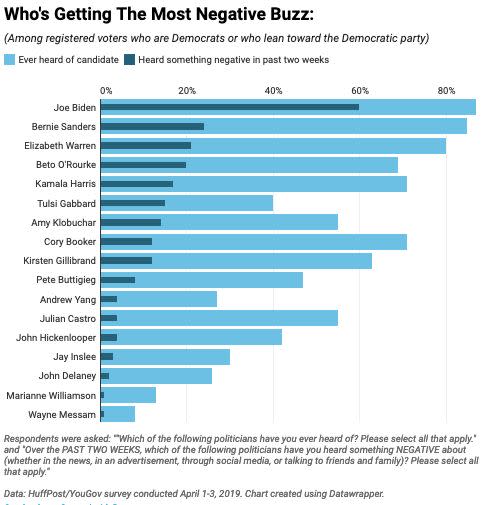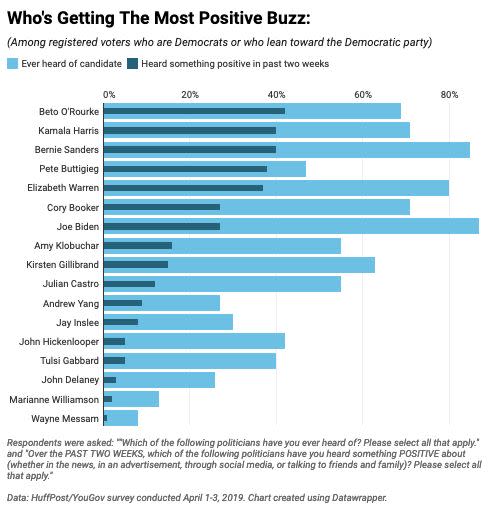Joe Biden Gets A Rocky Welcome To The 2020 Campaign
Until last week, former Vice President Joe Biden had the benefit of being the 2020 frontrunner for the Democratic presidential nomination without any of the inconveniences of officially running for it.
His stature in the party and his relatively strong early polling, combined with his slow-burn path toward an official declaration, kept his name consistently in the news, even as his many rivals gamely vied for attention. But without an active public office to run or the logistics of an official campaign to manage, Biden was spared from many of the factors that weigh on a politician’s poll numbers.
Now, although still delaying a candidacy declaration, Biden faces his first real negative news cycle as an expected White House contender. A former Nevada assemblywoman, Lucy Flores, wrote in an op-ed last week that during a 2014 political event, he kissed the back of her head without her consent, prompting several other women to recount their own stories of Biden making them physically uncomfortable.
In his initial response to Flores’ accusation, Biden said in a statement that he did not ever believe he was acting inappropriately, but would “listen respectfully” to suggestions he had done so.
On Wednesday, he issued a more substantial mea culpa, saying on his Twitter account, “Social norms are changing. I understand that, and I’ve heard what these women are saying. Politics to me has always been about making connections, but I will be more mindful about respecting personal space in the future. That’s my responsibility and I will meet it.”
The stories about Biden’s behavior appear to have gained significant traction, according to a new HuffPost/YouGov poll tracking what voters are hearing about the candidates. Sixty percent of Democratic voters and voters who lean toward the party say they’ve recently heard something negative about Biden. No other candidates, by contrast, had a negative story reach more than a quarter of the potential electorate.

Concerns about Biden’s behavior also seem to be crowding out his more favorable coverage. In the last HuffPost/YouGov survey, a majority of Democratic and Democratic-leaning voters said they’d heard something positive about Biden, placing him head-and-shoulders away from the rest of the pack. In the most recent, just 27% said they have heard similarly good news about him, moving him to a less-distinguished place in the middle.

Among the other prospective Democratic nominees, Pete Buttigieg has been having a good few weeks. Following his appearance at a CNN town hall, the mayor of South Bend, Indiana, has been the subject of generally positive stories on his fundraising, his fondness for the works of James Joyce and his impromptu marriage-officiating.
The percentage of Democratic voters who said they’d heard of him rose 17 points from two weeks ago, although it remains just below half. And the share of Democratic voters who say they’ve heard good things about him recently puts him roughly alongside higher-profile candidates such as former Rep. Beto O’Rourke of Texas and Sens. Kamala Harris of California, Bernie Sanders of Vermont and Elizabeth Warren of Massachusetts.
O’Rourke’s share of the positive buzz appears to have dipped slightly following his campaign launch, but he remains at the top of the pack; the numbers for Sanders, Warren and Harris have remained relatively stable.
With a few differences, that grouping of top candidates generally tracks with other data available on which candidates are garnering the most coverage. On one prominent medium ― cable TV ― the lion’s share of attention last week went to O’Rourke, Harris, Sanders, Warren and Sens. Cory Booker of New Jersey and Amy Klobuchar of Minnesota, according to analysis from 538.
All of this, of course, is about as predictive of the candidates’ eventual fortunes as the negligible fluctuations in horserace polls currently making headlines elsewhere on the internet ― which is to say, really not at all. These questions aren’t a direct measure of voters’ own current attitudes about the candidates, let alone a proxy for whom they’ll be inclined to vote for in 2020. While the polling suggests most Democratic voters are now aware of the stories about Biden, for instance, it’s not at all clear how many of his potential supporters will find them significantly troublesome.
The mere fact that Biden or Buttigieg’s numbers could shift so significantly in two weeks should also serve as a pretty good indication of the likelihood that things will change even more in the many months still remaining before voters meet for a caucus or cast a primary ballot.
Rather, the numbers are designed to supply some quantitative data on the way the campaign is developing as candidates jockey for attention in a crowded field ― whose narratives are catching, whose gaffes are gaining unwanted traction.
By that metric, at least, Biden is finally getting dragged into the fray with everybody else.
Use the widget below to further explore the results of the Huffpost/YouGov survey, using the menu at the top to select survey questions and the buttons at the bottom to filter the data by subgroups:

The HuffPost/YouGov poll consisted of 1,000 completed interviews conducted April 1-3 among U.S. adults, including 370 Democratic and Democratic-leaning voters, using a sample selected from YouGov’s opt-in online panel to match the demographics and other characteristics of the adult U.S. population.
HuffPost has teamed up with YouGov to conduct daily opinion polls. You can learn more about this project and take part in YouGov’s nationally representative opinion polling. More details on the polls’ methodology are available here.
Most surveys report a margin of error that represents some but not all potential survey errors. YouGov’s reports include a model-based margin of error, which rests on a specific set of statistical assumptions about the selected sample rather than the standard methodology for random probability sampling. If these assumptions are wrong, the model-based margin of error may also be inaccurate. Click here for a more detailed explanation of the model-based margin of error.
Love HuffPost? Become a founding member of HuffPost Plus today.
This article originally appeared on HuffPost.

